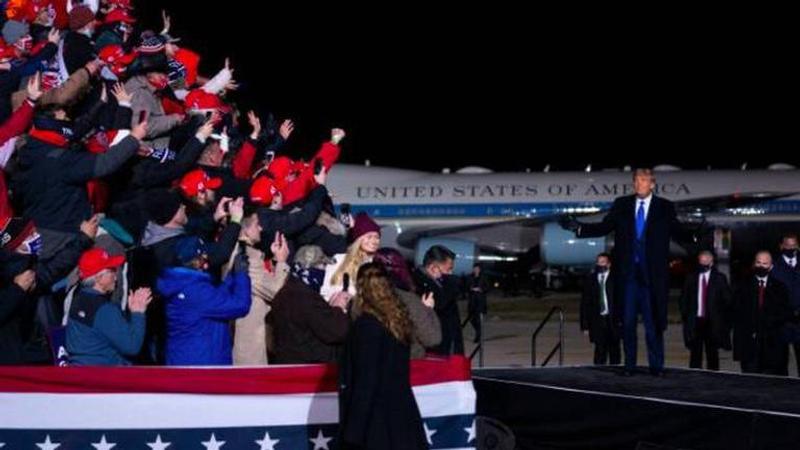Published 13:18 IST, November 1st 2020
Trump rallies may have led to 30,000 COVID-19 cases & more than 700 deaths: Study
Trump administration has been criticized for holding large gatherings with no social distancing or masks; scientists had called these rallies ' superspreaders'.

Donald Trump’s election campaign rallies have resulted in hundreds of coronavirus related deaths, and tens of thousands of COVID-19 cases, according to the findings of a Stanford University report. Released on October 31, the researchers in the Stanford economics department said that the US President's rallies with packed crowd caused "more than 30,000 incremental confirmed cases" and "likely led to more than 700 deaths”.These campaign rallies were held across the United States between June 20 and September 22.
Researchers B. Douglas Bernheim, Nina Buchmann, Zach Freitas-Grof, and Sebastian Otero studied the relation between large group meetings and the spread of COVID-19 in eighteen Trump campaign rallies. The analysis encompassed at least ten post-rally weeks for each event. They found that the Trump campaign rallies held in the crammed spaces with large assembly increased the number of confirmed cases of COVID-19 by more than 250 per 100,000 residents. People who contracted the coronavirus at these rallies spread the virus among the families and friends. Therefore, eighteen Trump rallies infected more than 30,000 and led to 700 fatalities.
Thank you Pennsylvania! With your vote, we will continue to support our Military, Veterans and our Police Officers. Biden and Harris would pass legislation to slash police funding all across America. They stand with the rioters – we stand with the HEROES of Law Enforcement! #MAGA pic.twitter.com/qqTZPLqzFV
— Donald J. Trump (@realDonaldTrump) November 1, 2020
Social distancing behaviors and lockdown orders have saved thousands of lives. New research on the early weeks of the pandemic, by SIEPR Senior Fellow Matthew Gentzkow and others, gives sobering estimates of what happened and what could have been. Details: https://t.co/wdMe1GFRVK pic.twitter.com/PLD1oFtVuY
— Stanford Econ Policy (@SIEPR) October 27, 2020
Trump administration has repeatedly been criticized for holding large gatherings with no social distancing or masks. Earlier, US CDC had said that large in-person events, particularly in settings where participants do not wear masks or practice social distancing “pose a substantial risk of further contagion.” They had called the rallies “superspreader events”. In a televised interview with CNN, NIAID director Anthony Fauci had condemned Trump rallies, saying attending one was “asking for trouble” as the large in-person assembly risks coronavirus outbreak.
Joe Biden knows that the presidency is the duty to care, and to fight for all Americans - regardless of their politics.
— Andrew Bates (@AndrewBatesNC) October 31, 2020
Donald Trump doesn't even care about the very lives of his strongest supporters, let alone anyone else's. https://t.co/h2VRb6pTpI
Use of masks and social distancing nil
Scientists at Stanford studied the incidence of COVID-19 at the county level across the US, including Tulsa, Phoenix, Bemidji, Pittsburgh, Jacksonville, and Fayetteville. “It appears that the number of attendees was generally in the thousands and sometimes in the tens of thousands,” the research found, adding, that at these rallies, mostly through September 2020, the degree of compliance with guidelines concerning the use of masks and social distancing was “nil”.
[Supporters wait outside the airport before President Donald Trump speaks at a campaign rally Friday, Oct. 30, 2020, in Rochester, Minn. Credit: Bruce Kluckhohn/AP]
Trump campaign downplayed the risk of infection, scientists said. While the infection rate post-Trump rallies were significantly high, it was found that pseudo-treatment effects for the placebo events were statistically insignificant, which underscores the reliability unlike Trump’s claims of it being a “potential cure”. The data on the incidence of COVID-19 was maintained by the COVID-19 Data Repository of Center for Systems Science and Engineering (CSSE) at Johns Hopkins University. The CSSE collected the caseload and death reports from the CDC and US state and local governments.
(Image Credit: AP)
Updated 13:18 IST, November 1st 2020





